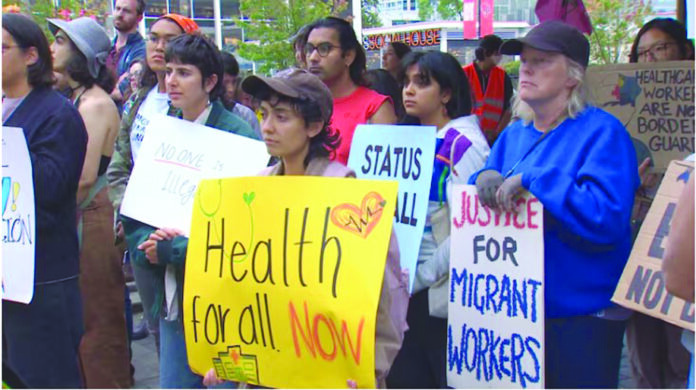Burnaby, BC, 11 January 2025 – In the discourse surrounding governance, the terms “parasitic governance” and “Machiavellianism” evoke powerful imagery of political systems that thrive not through virtuous leadership but through exploitation and manipulation. Parasitic governance, a term derived from political theory, refers to systems in which those in power drain resources from the public without providing equitable returns, fostering inequality and stagnation. Machiavellianism, on the other hand, describes political manipulation marked by deceit, opportunism, and a lack of ethical considerations. When these two phenomena intersect, they form a governance model that undermines trust, erodes social cohesion, and perpetuates systemic inequalities.
The Filipino diaspora, one of the fastest-growing immigrant groups in Canada, has been subject to a unique set of challenges that stem from both systemic discrimination and the strategic manipulation of public policy by political elites. The Canadian government’s handling of immigration and labour policies has often been framed in a Machiavellian context—where the short-term political and economic gain is prioritized over the long-term integration and well-being of immigrant populations (Kymlicka, 2012).
For the Filipino community, this has meant a paradoxical existence:
While their contributions to the Canadian economy, particularly in healthcare, construction, and service industries, are essential, they are often relegated to lower-wage, precarious employment, thus perpetuating their economic vulnerability.
The term “parasitic governance” finds resonance in how the Canadian political apparatus exploits the labour of immigrant communities while failing to provide commensurate social mobility. While Canada’s immigration policies ostensibly promise opportunities for a better life, they are often designed to benefit the state and corporations more than the immigrants themselves. Filipino workers, particularly in sectors such as caregiving and domestic work, are integral to the functioning of the Canadian economy, yet they are disproportionately subjected to underemployment and labour exploitation (Fournier, 2018). In this sense, the government acts as a parasitic entity, benefiting from the labour of these workers while offering limited protection and upward mobility.
Moreover, the Canadian government’s approach to immigration—centred around economic utility rather than human dignity—reflects a Machiavellian disregard for the welfare of immigrant communities. Policies such as the Temporary Foreign Worker Program (TFWP) have been critiqued for creating a cycle of dependency where workers, particularly from the Philippines, are caught in a system that benefits employers but does little for the workers’ long-term stability. Under these programs, workers often face conditions of exploitation, lacking the security of permanent residency or the full rights afforded to Canadian citizens (Peach, 2019). The government’s strategic management of these programs reveals a Machiavellian pragmatism: immigrant labour is a tool for economic growth, but immigrants are treated as expendable commodities rather than valued members of society.

The ramifications of these policies extend beyond mere economic hardship. The Filipino community in Canada experiences social marginalization, as their contributions are often undervalued, and their integration into Canadian society is stunted. The persistence of a racialized hierarchy within labour markets and the lack of sufficient social services exacerbate feelings of alienation. This marginalization, fueled by parasitic governance and Machiavellian political tactics, results in a society where the promise of equity and inclusion is subverted by a system designed to benefit a select few at the expense of many.
This dynamic is particularly pronounced in BC. The provincial government’s approach to housing, healthcare, and social services often overlooks the unique needs of immigrant communities, which are compounded by the specific challenges faced by Filipino Canadians.
The lack of affordable housing, for instance, disproportionately affects immigrant families who may already be living in precarious financial conditions. Furthermore, the healthcare system’s failure to adequately address the linguistic and cultural needs of Filipino-Canadian patients results in gaps in service provision, with many immigrants falling through the cracks. In these instances, the government’s inaction or insufficient response can be seen as an extension of parasitic governance—draining the community’s resources while failing to deliver the services necessary for their well-being.
The Filipino community, however, has not remained passive in the face of these challenges. Activism and advocacy have emerged as essential responses to exploitative governance structures. Filipino community leaders and organizations increasingly call for more comprehensive immigration reform, better labour protections, and more diversely inclusive social policies. These efforts reflect a broader desire to shift the conversation from a Machiavellian calculus of political expedience to a framework grounded in justice, equity, and human dignity (Soriano, 2017).
Thus, the intersection of parasitic governance and Machiavellianism within Canadian political and economic systems creates a precarious environment for the Filipino diaspora. By strategically exploiting immigrant labour and providing insufficient support for their social and economic integration, the Canadian government perpetuates systemic inequalities that stifle the potential of these communities. The Filipino experience is a stark reminder of the human cost of governance that prioritizes political and economic gain over genuine social progress. As such, the challenge remains: Can Canadian governance move beyond these exploitative practices and offer a more equitable future for all its citizens, including its immigrant populations?
References
- Fournier, S. (2018). Temporary foreign workers in Canada: Exploitation and marginalization in the global labor market. Canadian Review of Sociology, 55(3), 300-319. https://doi.org/10.1111/cars.12186
- Kymlicka, W. (2012). Multicultural citizenship: A liberal theory of minority rights. Oxford University Press.
- Peach, M. (2019). The exploitation of migrant labor in Canada’s temporary foreign worker program. Journal of Canadian Studies, 53(2), 53-75. https://doi.org/10.3138/jcs.53.2.53
- Soriano, A. (2017). Social justice and immigrant labor: Filipino activism in Vancouver. Social Movement Studies, 16(4), 446–460. https://doi.org/10.1080/14742837.2017.1345723
5. Ball, D. (2023, November 24). Vancouver migrant rights activists join National Day of Protest for workers’ status. CBC News. https://www.cbc.ca/news/canada/british-columbia/vancouver-migrant-rights-activists-join-national-day-of-protest-for-workers-status-1.6969916.
By Bella Balisi-Bevilacqua
MBB



